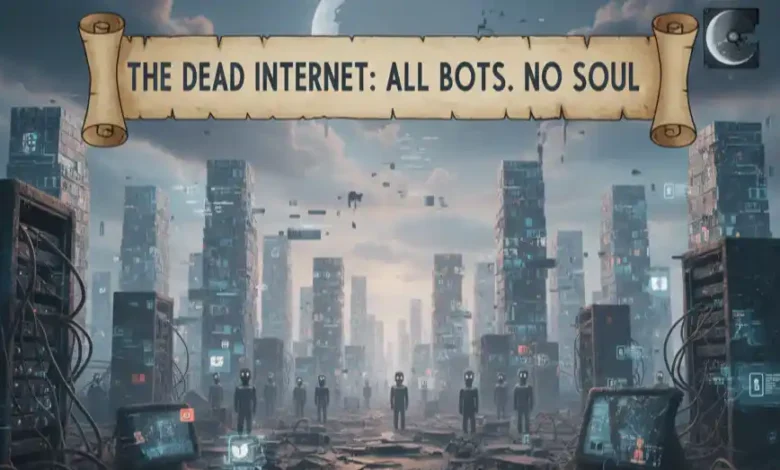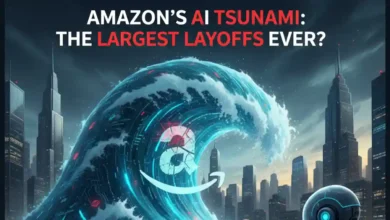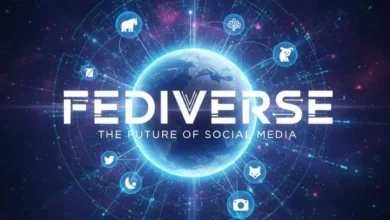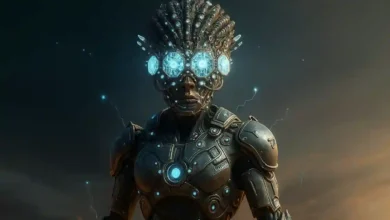
The very thing you are reading right now, the internet, might not be as alive and authentic as you imagine. In fact, according to a strange and unsettling idea known as the Dead Internet Theory, much of what we encounter online may no longer be human at all. Behind the curtains of social media feeds, search results, and even comment sections lies a growing suspicion: bots, algorithms, and now artificial intelligence might be the true architects of the content landscape.
Is the internet still “alive,” driven by human voices and communities? Or has it slipped into a silent transformation where machine-generated interactions dominate? More importantly, what does this mean for the future of truth, authenticity, creativity, and our collective digital experience?
Welcome to the strange world of the Dead Internet Theory, and how AI is pushing it from “conspiracy” to reality.
What Is the Dead Internet Theory?
The Dead Internet Theory is a concept that emerged in online discussions around 2020 but traces its roots back to earlier whispers in internet forums. It claims that the “real” internet, the chaotic, decentralized, grassroots web of people sharing blogs, building communities, and engaging authentically, has been slowly replaced by AI-generated or bot-driven content.
In its most extreme version, proponents believe that:
- Most online discussions are not human-to-human but machine-to-human interactions.
- Search engines have been feeding pre-shaped narratives through ranking algorithms.
- Entire regions of the internet are filled with automated filler content masquerading as genuine human posts.
- The Big Tech ecosystem, intentionally or unintentionally, relies more on simulations of conversations than actual discussions.
While that may sound far-fetched, there are undeniable truths hidden inside. The rise of generative AI, automated content farms, and algorithmic feeds has made the internet less transparent and more synthetic than ever.
From “Live” to “Simulated” Internet
In the early 2000s, the web felt alive. Forums, blogs, fan pages, and niche communities flourished. Every comment in a chatroom or post on a blog carried the unpredictability of human thought. It was messy, raw, and personal.
Fast forward to today, and the difference is striking:
- Search results often contain repetitive, copy-paste style articles optimized for algorithms rather than readers.
- Social media feeds are filled with recommended content that feels eerily same-ish—like endless reflections in a hall of mirrors.
- Comments sections are frequently spammed by bots, engagement hacks, and now AI-powered persona accounts.
- News narratives are increasingly shaped by SEO farms and AI-assisted clickbait.
In short, the “live” element of the internet—the unpredictable chaos—has been replaced by synthetic predictability.
How AI Is Accelerating the “Death”
Generative AI is the silent engine driving the Dead Internet Theory into mainstream relevance. With tools like large language models, AI music generators, and image creators, machines can flood the digital space with convincing content at nearly zero cost.
Here’s how AI is transforming the web in ways that echo the Dead Internet Theory:
- Infinite Content Supply: AI can mass-produce blogs, product reviews, fake news, and comment replies, overwhelming human-created content.
- Synthetic Personas: AI avatars and “sock puppet” accounts can impersonate real people, shaping opinions without human involvement.
- Algorithmic Loops: AI-generated content feeds recommendation algorithms, which in turn boost that same AI content, creating a closed feedback loop.
- Dissolving Authenticity: Human creativity is harder to verify, as AI models learn to mimic emotions, slang, and even cultural nuances.
- Search Engines and SEO: Platforms like Google and Bing face a flood of AI content, reshaping how results are ranked, and forcing SEO to evolve from “keyword gameplay” to authenticity verification.
SEO in the Age of the Dead Internet
If the internet is increasingly filled with synthetic content, how do creators, marketers, and businesses ensure visibility? This is where SEO (Search Engine Optimization) faces its greatest transformation.
- E-A-T (Expertise, Authoritativeness, Trustworthiness) becomes critical as search engines aim to distinguish human experts from machine spam.
- Authenticity Signals like author profiles, original research, and verified identities will gain priority.
- Agentic AI tools will play double roles—both generating content and helping users navigate the saturation of machine-written text by filtering relevance.
- Zero-click answers and AI summarization in search engines could mean that the “real” internet lives less in websites and more in AI-delivered narratives.
The irony? The very tools meant to keep the internet alive—AI-driven search assistants—may accelerate the dominance of AI content, swallowing the web into a recursive system of machine echo chambers.
The Role of Agentic AI in the “Dead Internet”
Agentic AI: AI systems capable of not just generating but deciding, recommending, and acting have immense power in this evolving ecosystem. Instead of passively retrieving information, these agents can:
- Curate entire browsing experiences.
- Filter out “junk” content automatically.
- Rewrite search results into personalized narratives.
- Engage in real-time discussions that simulate human connections.
But agentic AI is also a double-edged sword. While it promises to restore clarity by cutting through algorithmic noise, it also risks becoming the ultimate gatekeeper of the internet, deciding what you see and what remains hidden. If the original vision of the internet was free exploration, agentic AI turns it into a guided tour—convenient, but curated.
What This Means for the Future
The Dead Internet Theory may have started as a fringe idea, but AI’s explosive growth makes it eerily prophetic. Here’s what might happen in the near future:
- The next internet battles will not be about censorship vs. free speech, but about human vs. synthetic content.
- Museums of the “old internet” may emerge, archiving original message boards, blogs, and digital artifacts as proof of humanity’s online past.
- Trust economies could replace traditional SEO, where authenticity certificates, blockchain verification, and proof-of-humanity tags define credibility.
- Agentic AI will either revive the living internet by filtering noise or become its undertaker by fully automating interactions.
A Thought to Leave You With
If the Dead Internet Theory is true, then much of what you see, read, and hear online may already be part of a simulation, a giant mirror reflecting not human creativity but endless machine-generated echoes.
And yet, here you are, reading this. The very act of seeking understanding, of questioning whether the internet is alive or dead, proves that something uniquely human still pulses across the digital landscape: curiosity.
So the real question is not whether the internet is dead, it’s whether we’ll allow AI to become its new life form.
For more Odinozz Tech articles, click here.
Follow Odinozz on social media. Click here.



